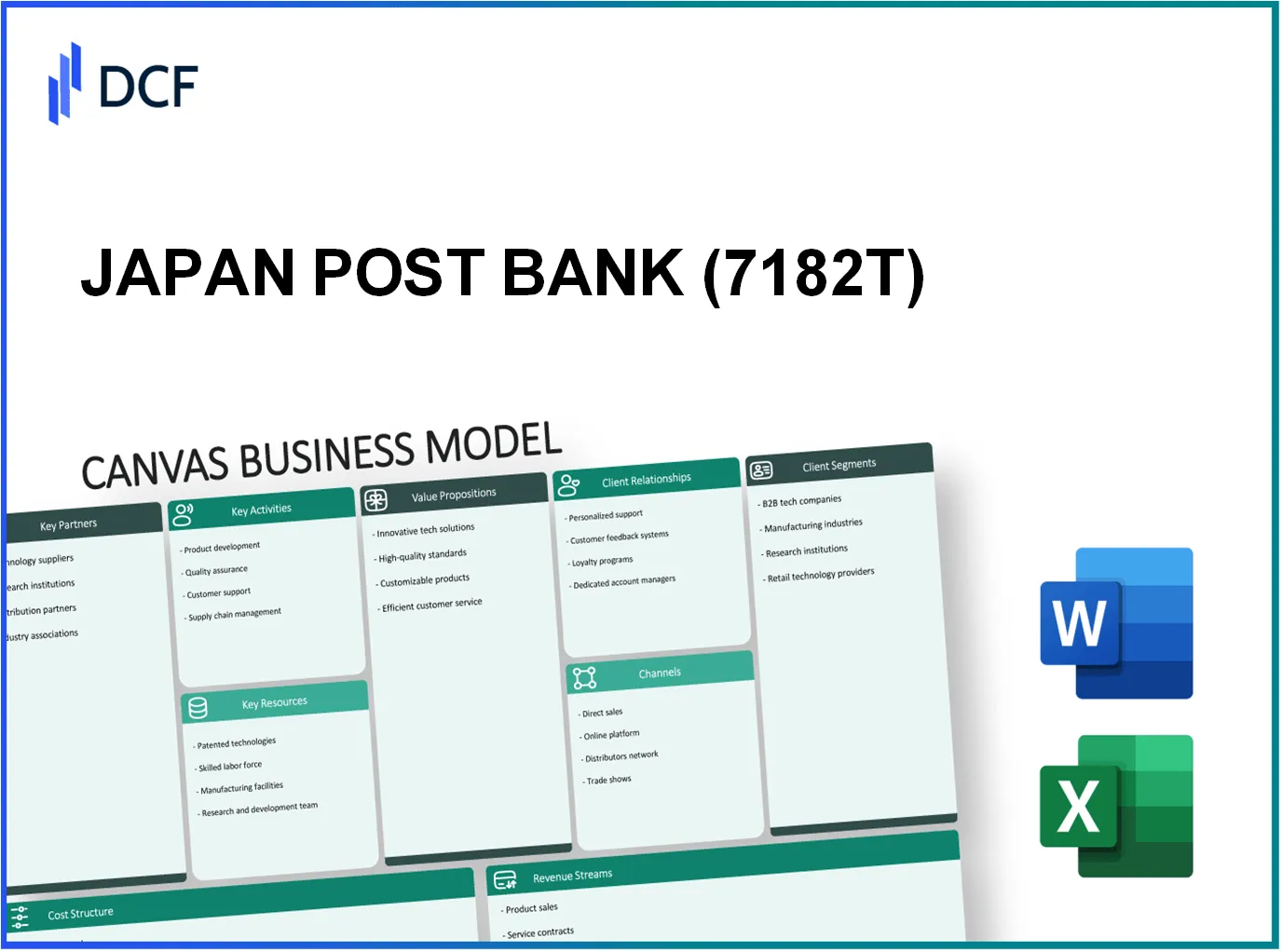Exploring the intricate framework of JAPAN POST BANK Co., Ltd.'s Business Model Canvas reveals how this financial giant effectively manages a vast network while delivering exceptional value to various customer segments. From its deep-rooted partnerships with Japan Post Holdings to its robust IT infrastructure, discover the key components that drive its operational success and how it navigates the competitive landscape of banking in Japan. Dive in to uncover the elements that make JAPAN POST BANK a cornerstone of financial services in the nation.
JAPAN POST BANK Co., Ltd. - Business Model: Key Partnerships
Japan Post Bank Co., Ltd. has developed a strategic framework of key partnerships that are vital for its operations and growth. The following outlines its significant partnerships:
Partnerships with Japan Post Holdings
Japan Post Bank operates under the broader umbrella of Japan Post Holdings. This affiliation provides the bank with a unique advantage in terms of customer reach and service integration. As of March 2023, Japan Post Holdings reported total assets of ¥255 trillion (approximately $1.9 trillion). This vast network allows Japan Post Bank to leverage a significant customer base across its more than 24,000 post office locations throughout Japan.
Collaborations with Financial Technology Providers
To enhance its digital banking services, Japan Post Bank collaborates with several financial technology (fintech) firms. Notably, in 2022, the bank partnered with Yokohama-based fintech company Money Forward to improve its digital payment solutions. This collaboration is part of a broader trend, as Japan is witnessing a surge in fintech adoption, projected to reach a market size of ¥1.1 trillion (approximately $8 billion) by 2025.
Alliances with Insurance Companies
Japan Post Bank has formed strategic alliances with various insurance companies to offer integrated financial products. These alliances are crucial as the bank reported insurance-related income of ¥450 billion (approximately $3.3 billion) in the fiscal year ending March 2023. Key partners in this sector include major firms like Tokio Marine Holdings and Sumitomo Life Insurance, allowing Japan Post Bank to provide a suite of insurance products alongside traditional banking services.
Government Regulatory Bodies
Collaborating with government regulatory bodies is essential for compliance and operational efficiency. Japan Post Bank works closely with the Financial Services Agency (FSA) of Japan, which oversees the banking industry. As of the latest reports, the bank maintains a capital adequacy ratio of 12.5%, well above the FSA's statutory requirement of 8%, ensuring financial stability and trust in its operations.
| Partnership Type | Partner Name | Year Established | Financial Impact |
|---|---|---|---|
| Holding Company | Japan Post Holdings | 2007 | ¥255 trillion in assets |
| Fintech Collaboration | Money Forward | 2022 | Target market size: ¥1.1 trillion by 2025 |
| Insurance Alliance | Tokio Marine Holdings | Multiple | ¥450 billion in insurance income (FY 2023) |
| Regulatory Collaboration | Financial Services Agency (FSA) | Ongoing | Capital adequacy ratio: 12.5% |
JAPAN POST BANK Co., Ltd. - Business Model: Key Activities
JAPAN POST BANK Co., Ltd. (JPB) plays a crucial role in Japan’s financial landscape, offering services that cater to a wide range of customer needs. The following key activities are central to its business model.
Providing Retail Banking Services
As of the end of March 2023, JPB reported over 47 million retail banking accounts. The bank provides a variety of retail banking services, including savings accounts, loans, and payment services. The total assets managed by JPB stood at approximately ¥205 trillion (around $1.5 trillion), positioning it as one of the largest banks in Japan.
Managing Postal Savings Accounts
JPB specializes in managing postal savings accounts, which are essential for many Japanese citizens. The total amount of postal savings deposits reached around ¥193 trillion (approximately $1.4 trillion) as of March 2023. The bank offers competitive interest rates, attracting a significant number of depositors.
Offering Financial Advisory Services
JPB provides financial advisory services aimed at helping customers manage their finances and investments more effectively. In the fiscal year 2022, JPB reported that its advisory services generated approximately ¥56 billion (about $400 million) in revenues. The bank serves a large number of individuals and small businesses, providing tailored advice on financial planning.
Conducting Investment Operations
Investment operations are a critical activity for JPB, contributing significantly to its income. The bank’s investment portfolio includes government bonds, corporate bonds, and equities. As of March 2023, JPB’s total investment assets were valued at approximately ¥30 trillion (around $225 billion). The annual return on investments reached about 2.5%, highlighting its effective management in a challenging financial environment.
| Key Activity | Metrics | Financial Impact |
|---|---|---|
| Retail Banking Services | 47 million accounts; ¥205 trillion assets | Significant asset accumulation; diversified revenue streams |
| Postal Savings Accounts | ¥193 trillion in savings deposits | Stable funding source; high customer retention |
| Financial Advisory Services | ¥56 billion revenue from advisory | Value-added service; enhances customer engagement |
| Investment Operations | ¥30 trillion in investment assets; 2.5% annual return | Robust income generation; effective asset management |
JAPAN POST BANK Co., Ltd. - Business Model: Key Resources
Japan Post Bank Co., Ltd. operates with a variety of key resources that enable it to serve its customers effectively. Below is an outline of these resources:
Extensive network of post offices
Japan Post Bank has a vast network of over 24,000 post offices across Japan. This extensive presence allows the bank to reach a diverse customer base, including rural and urban areas. The copious number of branches facilitates customer interaction and enhances service accessibility.
Robust IT infrastructure
The company's IT spending was approximately ¥140 billion (about $1.3 billion) in the fiscal year 2022. This investment supports advanced digital banking services, cybersecurity measures, and customer data management systems, ensuring seamless banking operations and customer satisfaction.
Skilled financial professionals
Japan Post Bank employs over 36,000 skilled professionals in various financial roles. The workforce includes experts in risk management, customer service, and investment strategies, providing significant value through their knowledge and experience in the financial sector.
Brand reputation and trust
Japan Post Bank is part of the Japan Post Group, which has a brand trust level of 85%, according to consumer surveys. This reputation is crucial in retaining existing customers and attracting new ones, especially in the financial services sector where trust is paramount.
Key Resources Overview
| Resource | Description | Value/Impact |
|---|---|---|
| Post Office Network | Number of branches available for customer access | 24,000 branches |
| IT Infrastructure | Investment in digital banking and security | ¥140 billion (≈ $1.3 billion) |
| Human Resources | Number of financial professionals employed | 36,000 skilled professionals |
| Brand Trust | Consumer trust level in the brand | 85% trust level |
These key resources collectively enable Japan Post Bank to maintain its competitive position in the financial market while delivering reliable services to its customers.
JAPAN POST BANK Co., Ltd. - Business Model: Value Propositions
Accessible banking services nationwide: Japan Post Bank operates approximately 24,000 locations across Japan, providing extensive reach and convenience for customers. As of the fiscal year 2022, the bank reported that around 95% of the Japanese population lives within reach of a postal facility where banking services are offered. This high accessibility plays a crucial role in attracting rural customers who may have limited access to traditional banks.
Safe and secure fund management: The bank ensures a strong focus on fund safety. As of September 2023, Japan Post Bank had a total assets value of approximately ¥214 trillion (around $1.96 trillion). With a capital adequacy ratio of 10.7%, Japan Post Bank is well above the regulatory requirement, showcasing its robust financial stability. Customer deposits reached ¥208 trillion (around $1.93 trillion), highlighting customer confidence in its secure fund management systems.
Comprehensive financial product offerings: Japan Post Bank provides a diverse array of financial products, including savings accounts, loans, investment trusts, and insurance services. As of the end of fiscal 2022, the bank reported over 50 million savings account holders. Loan balances reached approximately ¥12 trillion (around $110 billion), showcasing its strong presence in personal finance and borrowing. The product lineup is designed to meet the varied financial needs of its customer base, reinforcing its commitment to comprehensive service.
Strong customer trust and reliability: Japan Post Bank has consistently maintained a high level of customer trust. In a 2022 survey, the bank achieved a customer satisfaction score of 80%, significantly higher than the industry average of 70%. This trust is underscored by the bank's long history, with origins dating back to the post-war era, and its backing by the government. Its status is reflected in the high percentage of repeat customers, with over 60% of customers expressing intent to continue banking with Japan Post Bank for the foreseeable future.
| Key Performance Indicator | Value | Note |
|---|---|---|
| Total Assets | ¥214 trillion | As of September 2023 |
| Capital Adequacy Ratio | 10.7% | Well above regulatory requirement |
| Total Deposits | ¥208 trillion | Reflects customer confidence |
| Number of Savings Accounts | 50 million | As of end of fiscal 2022 |
| Loan Balances | ¥12 trillion | Indicates market share in personal finance |
| Customer Satisfaction Score | 80% | Survey result from 2022 |
| Repeat Customer Intent | 60% | Expressed intent for future banking |
JAPAN POST BANK Co., Ltd. - Business Model: Customer Relationships
JAPAN POST BANK Co., Ltd. emphasizes strong customer relationships through various personalized services and channels, enhancing customer satisfaction and loyalty. Below is an exploration of their customer relationship strategies.
Personalized Customer Service
The bank employs a personalized customer service approach, focusing on individual customer needs. This strategy is exemplified through their dedicated relationship managers who service high-net-worth clients. As of the fiscal year 2022, Japan Post Bank had approximately 32.5 million retail banking customers, indicating a substantial customer base that benefits from personalized interactions.
In-branch Support and Consultations
In-branch support is a core component of Japan Post Bank’s customer relationship strategy. The bank operates over 23,000 branches across Japan, providing face-to-face consultations. This extensive network allows customers to engage directly with bank representatives for financial advice and product consultations, which is critical for customer retention.
Digital Banking Platforms
Japan Post Bank has significantly invested in its digital banking platforms to cater to tech-savvy customers. As of 2023, the bank reported that 40% of its transactions were conducted through digital channels. Their mobile app has been downloaded over 10 million times, providing customers with 24/7 access to banking services including funds transfers, viewing account statements, and managing assets.
| Customer Interaction Channel | Number of Users | Transaction Percentage | Customer Satisfaction Rating |
|---|---|---|---|
| In-branch Support | Approx. 32.5 million customers | N/A | 85% |
| Digital Banking Platform | 10 million app downloads | 40% | 90% |
| Customer Support Hotline | N/A | N/A | 88% |
Ongoing Customer Engagement
Japan Post Bank focuses on ongoing customer engagement through tailored communication and feedback mechanisms. In the fiscal year 2022, the bank launched over 50 customer engagement campaigns, which included surveys and newsletters aimed at understanding customer needs and preferences. This has led to an increase in customer loyalty and repeat business, with a reported 75% retention rate among engaged customers.
JAPAN POST BANK Co., Ltd. - Business Model: Channels
JAPAN POST BANK Co., Ltd. utilizes a multi-faceted approach to reach its customers and deliver banking services effectively. The channels employed encompass both physical and digital platforms, enabling accessibility and convenience for the customers.
Extensive Post Office Network
With over 24,000 branch locations across Japan, JAPAN POST BANK leverages the existing post office infrastructure to provide banking services. The bank is integrated into the Japan Post Group, which includes more than 15,000 post offices serving as banking outlets, thus maintaining a strong physical presence in urban and rural areas alike.
Online Banking Portal
The online banking platform of JAPAN POST BANK reported over 22 million registered users as of the latest fiscal year. This platform facilitates a wide range of services including fund transfers, loan applications, and account management. The bank's online banking portal has experienced a growth rate of 10% year-over-year, reflecting increasing customer preference for digital services.
Mobile App for Banking Services
The JAPAN POST BANK mobile application has been downloaded over 5.5 million times and boasts a user satisfaction rate of 4.5 stars on app stores. The app provides features such as balance inquiries, transaction history, and mobile payments, contributing to the overall digital banking experience. Usage of the app has surged by 25% in the past year, indicating a strong shift toward mobile banking.
Telephone Banking Services
JAPAN POST BANK also offers telephone banking services, which recorded approximately 1.2 million calls per month. These services assist customers with account inquiries, balance checking, and transaction support. The telephone banking service has an average response time of 30 seconds, ensuring prompt customer service.
| Channel | Details | Statistics |
|---|---|---|
| Post Office Network | Physical banking locations | Over 24,000 branches |
| Online Banking Portal | Digital banking services | 22 million registered users |
| Mobile App | Banking services on mobile devices | 5.5 million downloads; 4.5-star rating |
| Telephone Banking | Customer service via phone | 1.2 million calls per month |
Through these diverse channels, JAPAN POST BANK effectively communicates its value propositions and provides a seamless banking experience to its customer base across Japan.
JAPAN POST BANK Co., Ltd. - Business Model: Customer Segments
JAPAN POST BANK Co., Ltd. services a diverse range of customer segments, addressing the unique needs of individuals and organizations throughout Japan. This segmentation allows the bank to tailor its offerings effectively.
Individual Account Holders
Japan Post Bank serves approximately 100 million individual account holders, making it one of the largest banks in terms of customer base. Among them, over 57 million actively use online banking services. The average balance held per individual account is around ¥2 million (approximately $18,000), providing the bank with a significant deposit base. In fiscal year 2022, the bank reported net income of ¥292 billion (approximately $2.6 billion) largely driven by fees and interest from individual accounts.
Small to Medium Enterprises
Japan Post Bank caters to more than 1.1 million small and medium enterprises (SMEs) across Japan. These businesses primarily utilize the bank's services for business accounts, loans, and investment products. The total outstanding loans to SMEs reached approximately ¥5 trillion (about $45 billion) as of March 2023. SMEs account for roughly 34% of the bank's total loan portfolio, highlighting their importance to the overall business model.
Corporate Clients
The bank also has a dedicated segment for corporate clients. Approximately 12,000 corporate accounts are managed, contributing to a significant portion of the bank's fee income. Corporate deposits reached about ¥10 trillion (around $90 billion) in 2023, representing 25% of the total deposit balance. The corporate lending segment showed an increase of around 8% year-over-year, with a focus on providing bespoke financing solutions.
Rural and Urban Populations
Japan Post Bank strategically targets both rural and urban populations, recognizing the varying financial needs across regions. Approximately 80% of the bank’s branches are located in rural areas, providing essential banking services to less accessible regions. Urban clients, including students and professionals, are serviced through more than 1,000 urban branches. The bank’s rural customer deposits average ¥1.5 million (around $13,500), while urban customers average about ¥3 million (approximately $27,000).
| Customer Segment | Number of Customers | Average Balance (¥) | Percentage of Total Deposits |
|---|---|---|---|
| Individual Account Holders | 100 million | ¥2,000,000 | 41% |
| Small to Medium Enterprises | 1.1 million | ¥5,000,000,000,000 (loans) | 34% |
| Corporate Clients | 12,000 | ¥10,000,000,000,000 (deposits) | 25% |
| Total Deposits | Estimated 243 trillion | N/A | 100% |
JAPAN POST BANK Co., Ltd. - Business Model: Cost Structure
The cost structure of JAPAN POST BANK Co., Ltd. is pivotal in understanding its operations and profitability. Below are the primary components that constitute its cost structure.
Operational costs of maintaining branches
As of the fiscal year 2022, JAPAN POST BANK operates approximately 25,000 branches across Japan. The estimated operational costs associated with maintaining these branches are around ¥500 billion annually. This includes expenses related to utilities, maintenance, and everyday operational activities.
IT infrastructure maintenance
The bank invests substantially in its IT infrastructure to ensure the secure and efficient operation of its services. In 2022, JAPAN POST BANK allocated about ¥100 billion for IT maintenance and system upgrades. This budget covers software licensing, hardware maintenance, and ongoing cybersecurity measures, ensuring compliance with financial regulations.
Employee salaries and benefits
Employee compensation represents a significant portion of JAPAN POST BANK's costs. In 2022, total employee salaries and benefits amounted to approximately ¥300 billion. This figure includes wages, bonuses, pension contributions, and health benefits for over 30,000 employees, reflecting the bank's commitment to attracting and retaining talent.
Marketing and promotional expenses
Marketing remains essential for JAPAN POST BANK to promote its services effectively. The company has budgeted approximately ¥40 billion for marketing and promotional activities in 2022. This encompasses advertising campaigns, customer engagement initiatives, and sponsorships aimed at increasing brand awareness and customer acquisition.
| Cost Component | Annual Cost (¥ Billion) | Description |
|---|---|---|
| Operational costs of branches | 500 | Utilities, maintenance, and operational activities for 25,000 branches. |
| IT infrastructure maintenance | 100 | Software, hardware maintenance, and cybersecurity measures. |
| Employee salaries and benefits | 300 | Salaries, bonuses, pension, and health benefits for over 30,000 employees. |
| Marketing and promotional expenses | 40 | Advertising, customer engagement, and sponsorship costs. |
JAPAN POST BANK Co., Ltd. - Business Model: Revenue Streams
Japan Post Bank Co., Ltd. generates revenue through multiple streams, capitalizing on its extensive banking and financial services. Below are the key revenue sources:
Interest income from loans and deposits
In the fiscal year 2022, Japan Post Bank reported ¥1.362 trillion in interest income from loans and deposits. The bank has a strong position in retail banking, primarily generating income from lending activities. The total balance of loans stood at approximately ¥37 trillion as of March 2023, while deposits reached around ¥215 trillion, which supports the interest income generation.
Service fees for account management
Japan Post Bank also earns revenue through service fees associated with account management. For the fiscal year 2022, service fees accounted for approximately ¥154 billion. These fees include monthly account maintenance fees and charges for additional banking services, reflecting the bank's strategy to diversify its income sources beyond traditional interest income.
Revenue from investment services
The bank provides various investment services, contributing another significant revenue stream. In 2022, revenue from investment-related operations was reported at ¥173 billion. This includes fees from wealth management products and securities transactions. The bank has focused on expanding this segment to cater to the growing demand for investment services among its customers.
Transaction fees from payment services
Transaction services also play a vital role in the bank’s revenue model. Japan Post Bank reported ¥110 billion in transaction fees from payment services in the fiscal year 2022. This includes fees generated from domestic and international remittances, as well as charges for the issuance and management of payment cards.
| Revenue Stream | FY 2022 Revenue (in ¥ billion) | Comments |
|---|---|---|
| Interest income from loans and deposits | 1,362 | Major revenue source from retail banking services. |
| Service fees for account management | 154 | Diversifying income through account-related services. |
| Revenue from investment services | 173 | Expanding offerings in response to investment demand. |
| Transaction fees from payment services | 110 | Includes fees from remittances and card services. |
Through these various revenue streams, Japan Post Bank Co., Ltd. effectively leverages its banking capabilities to maintain a stable financial performance while adapting to market demands.












